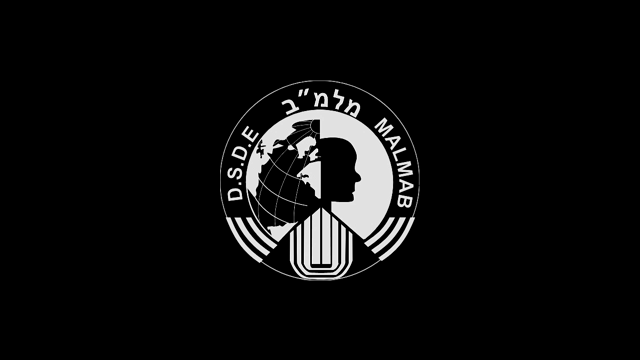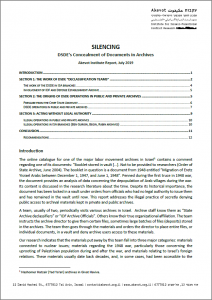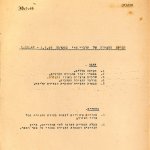
In a report published today, Akevot Institute reveals that for 17 years, the Director of Security of the Defense Establishment (DSDE), a Ministry of Defense division, has ordered to deny public access to individual documents and entire files in various archives with no legal authority to do so. The report: SILENCING: DSDE’s Concealment of Documents in Archives summarizes the findings of two years of research by Akevot Institute.
Today’s Haaretz Weekend Magazine runs a comprehensive investigative report journalist Hagar Shezaf has prepared following the report.

Since 2002, teams, usually of two, periodically visit various archives in Israel. Archive staff know them as “State Archive declassifiers” or “IDF Archive Officials”. Others know their true organizational affiliation. The team instructs the archive director to give them certain files, sometimes large batches of files stored in the archives. The teams then go through the materials and order the director to place entire files, or individual documents, in a vault and deny archive users access to these materials.
Our research indicates that the teams are mainly interested in three issues: materials connected to nuclear issues; materials regarding the 1948 war, particularly those concerning the uprooting of the Palestinian population during and after the war, and materials relating to Israel’s foreign relations.
Several years ago, former Chief State Archivist Dr. Yaakov Lozowick, concluded that the law makes no provision for DSDE powers to operate in archives. Despite this finding, the DSDE continues this work and its officials still conceal files and documents in various archives with no legal power to do so and in contravention of the law. In the few cases in which we were able to review the content of documents removed by the DSDE, their publication proved to pose no threat to security, as also evidenced in the clearance for publication given by the Israeli Military Censor.

Along with the release of this report, Akevot Institute publishes, for the first time, a key document removed by the DSDE: a comprehensive 1948 IDF intelligence report that contradicts the common Israeli narrative about the major factor in the displacement of Palestinians during the 1948 war. According to the 29-page report, during the early months of the war, operations by Jewish combatants were the major cause of Arab displacement, and the role played by the Arab leadership in encouraging “flight” was negligible. Akevot releases today both a digital copy of the Hebrew original and an English translation of the complete document.
In its recommendations, Akevot Institute calls on the DSDE to end all operations in Israeli archives immediately and on the Deputy Chief State Archivist to inform public and private archive directors in Israel that they are under no obligation to follow DSDE instructions to remove materials. Akevot also recommended the Association of Israeli Archivists appoint a professional to advise archives on issues related to providing public access to records that appear to be sensitive.
Public access to historical records in Israel is subject to close monitoring by the security establishment. The IDF and Security Establishment Archive, the largest archive in the country, has so far opened only one percent of its records to public access. The General Security Service (Shin Beth) archive, which contains highly valuable historical records is completely closed to the public and does not allow any research of its materials. The Israeli Military Censor has recently posted an officer to the ISA, as part of what was presented as a pilot program, to review archival records before they are made accessible to researchers and the public at large. The ISA has been holding back on uploading records to its website, the only channel open for public access at the ISA, citing, as the reason, that they had yet to be reviewed by the censorship. The meager access to archival records kept in government archives results in private and public archives being a major source for historical research of the State of Israel. However, the report’s findings show Israel’s security apparatus denies public access to records kept in non-state archives, without transparency and without legal power to do so. The work of the DSDE in these archives impedes access to historical records, which is the foundation of reliable, independent research. The cumulative effect of this is distortion of public and political discourse about major chapters and events in the history of the country and its peoples.
